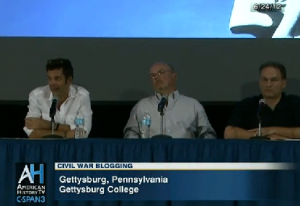A Few Words About Blogging and History
 Recently, historian Heather Cox Richardson posted on The Historical Society blog a brief summary of the benefits of blogging, tweeting, and texting for the historian. The post quickly caught on among those scholarly types who are Internet savvy and interested in such things. I picked it up from a Twitter retweet and retweeted it myself, and then several of my followers proceeded to retweet it too. I guess you could say that the post went about as viral as it can in our little world.
Recently, historian Heather Cox Richardson posted on The Historical Society blog a brief summary of the benefits of blogging, tweeting, and texting for the historian. The post quickly caught on among those scholarly types who are Internet savvy and interested in such things. I picked it up from a Twitter retweet and retweeted it myself, and then several of my followers proceeded to retweet it too. I guess you could say that the post went about as viral as it can in our little world.
I found her points to be right on the money. In sum, and I am paraphrasing here: blogging is short, sweet, and relatively easy when compared to writing an article length or longer academic piece. It's fun (yay), it forces you to write clear and concise prose, and it allows for a sense of humor. Bloggers do not need to be overly theoretical or use jargon and esoteric language. Both blogging a tweeting provide the platform for an author's personal style to shine through. Both are informal - and who doesn't love informality? Finally, she notes that blogging, tweeting (and I suppose texting) allow historians to share their enthusiasm with a larger audience. Yes indeed.
But I would add just a couple of other things to the list. First, blogging and tweeting can (and often do) function as extensions of what historians do. I speak, naturally, of primary research. I use my blog and twitter account for historical inquiry - engaging archivists, specialists, and other historians who have access to documents that might take me months or years to find (or not find) through traditional research methods. While I relish days spent in dusty special collections departments (I am not being sarcastic here, I think we all have a thing for crunchy old documents) sometimes I need information faster than it would take to get the funding and fly wherever to sift through archival boxes for something that may or may not exist. A blog post or a quick tweet generally yields results within twenty-four hours - if not sooner. Second, I use both blogging and tweeting as a teaching platform. I receive questions from people who are interested in history, other teachers, and high school and college students regularly. So regularly in fact, that I created a Youtube program called Office Hours designed specifically to address some of the questions. The show (usually a few minutes in length) got such a good response that I am developing an extended half-hour format with a real studio setting, editing, and everything (stay tuned).
I am pleased that social media have found a home in academia and that (many) historians are embracing the possibilities that social media offer. We are finding ways to incorporate Youtube, Twitter, Instagram, Pinterest, etc, etc for the benefit of historians and students alike. And...this is just the beginning. My next book will be in many ways a reflection of the scores of conversations of have had with both colleagues and an informed public on Twitter, Facebook, and in the comments section of this and other blogs. And of course...I will discuss this at length in my acknowledgements section.
With compliments, Keith